Unit 6 第二课时 Section A(Grammar Focus-3c) 课件【大单元教学】人教版七年级英语上册Unit 6 Do you like bananas
文档属性
| 名称 | Unit 6 第二课时 Section A(Grammar Focus-3c) 课件【大单元教学】人教版七年级英语上册Unit 6 Do you like bananas | 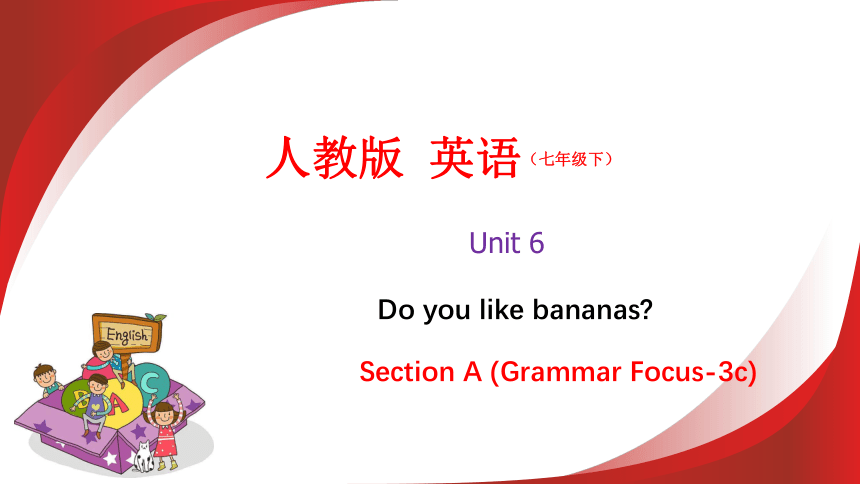 | |
| 格式 | pptx | ||
| 文件大小 | 5.2MB | ||
| 资源类型 | 试卷 | ||
| 版本资源 | 人教新目标(Go for it)版 | ||
| 科目 | 英语 | ||
| 更新时间 | 2023-09-21 12:47:06 | ||
图片预览


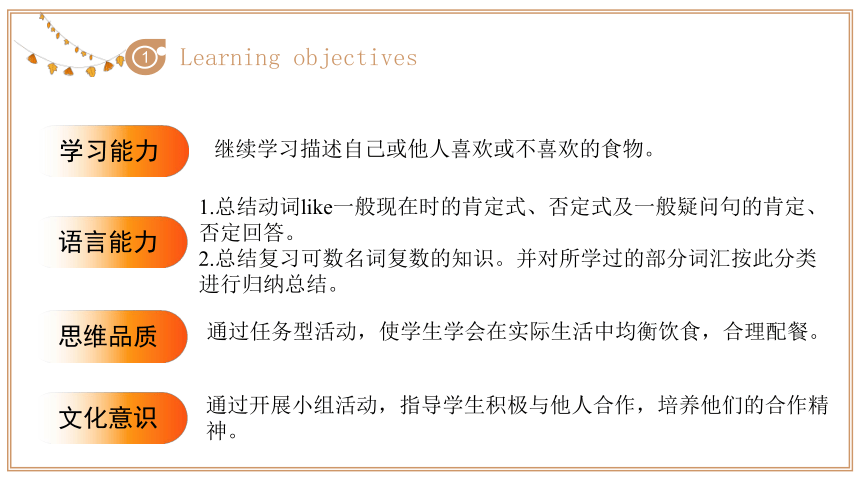
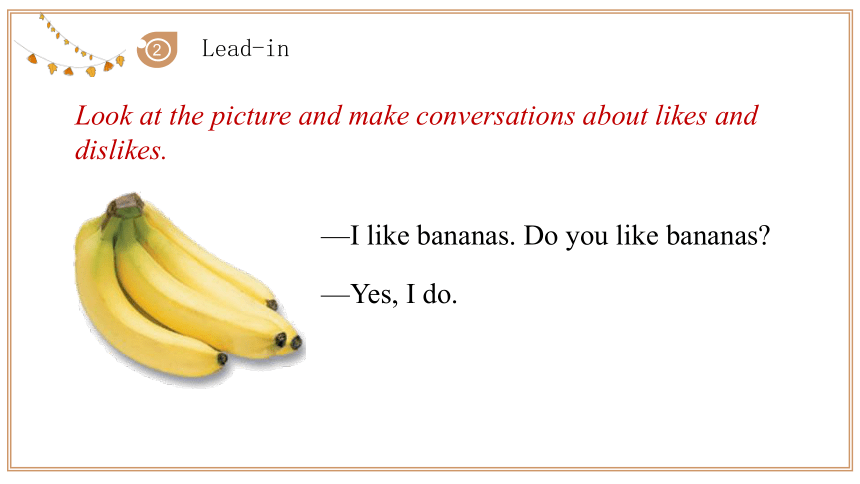
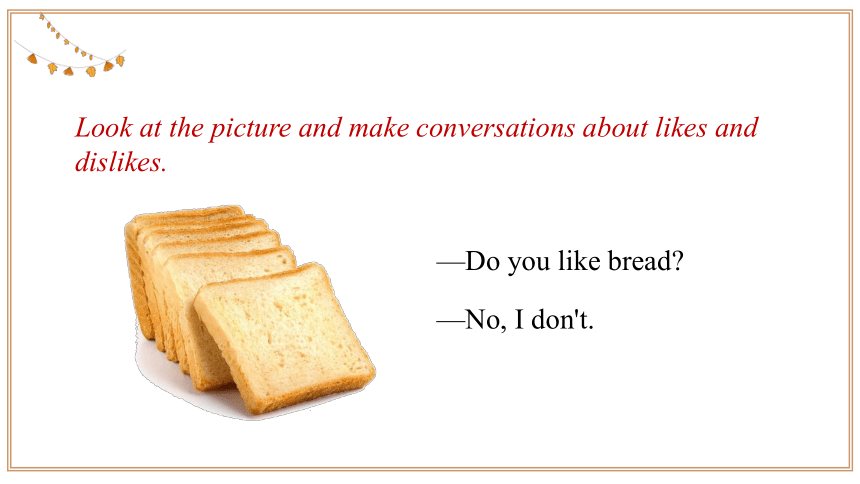
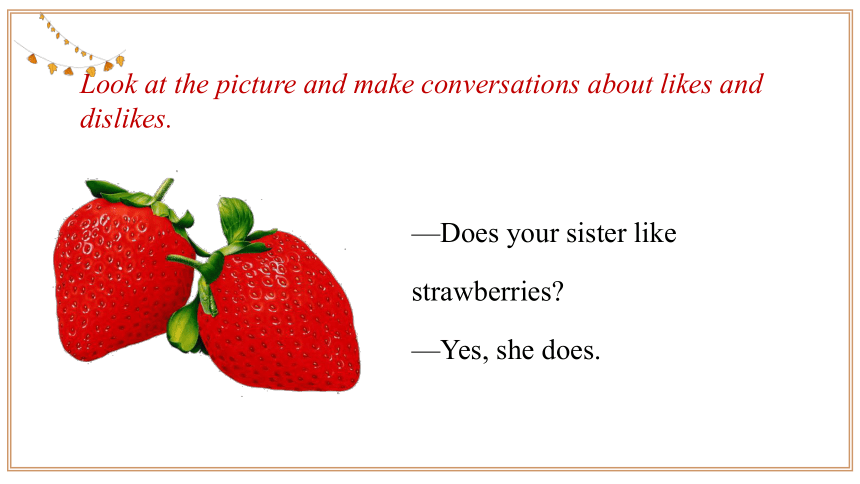
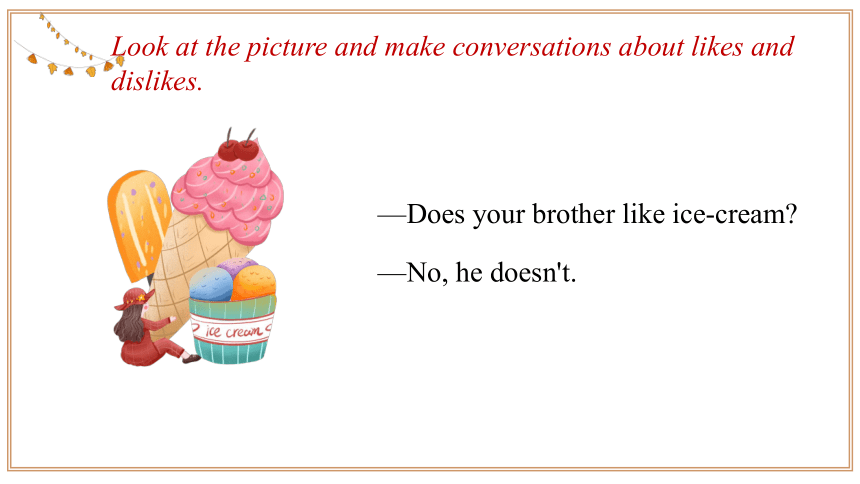

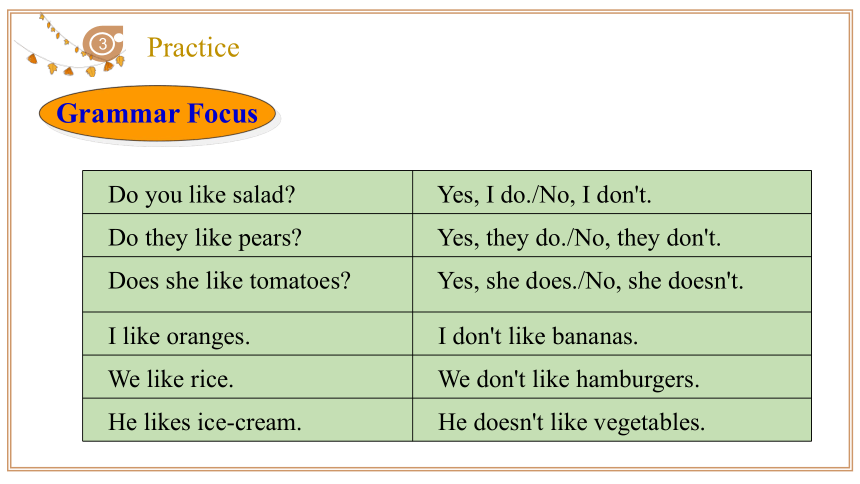
文档简介
(共29张PPT)
人教版 英语(七年级下)
Unit 6
Do you like bananas
Section A (Grammar Focus-3c)
Lead-in
1
2
Practice
3
Content
Summary
5
Exercises
6
Consolidation
4
Learning objectives
继续学习描述自己或他人喜欢或不喜欢的食物。
1.总结动词like一般现在时的肯定式、否定式及一般疑问句的肯定、否定回答。
2.总结复习可数名词复数的知识。并对所学过的部分词汇按此分类进行归纳总结。
文化意识
语言能力
思维品质
学习能力
通过任务型活动,使学生学会在实际生活中均衡饮食,合理配餐。
通过开展小组活动,指导学生积极与他人合作,培养他们的合作精神。
1
Learning objectives
Look at the picture and make conversations about likes and dislikes.
—I like bananas. Do you like bananas
—Yes, I do.
Lead-in
2
—Do you like bread
—No, I don't.
Look at the picture and make conversations about likes and dislikes.
—Does your sister like strawberries
—Yes, she does.
Look at the picture and make conversations about likes and dislikes.
—Does your brother like ice-cream
—No, he doesn't.
Look at the picture and make conversations about likes and dislikes.
How to talk about likes and dislikes
Do you like salad Yes, I do./No, I don't.
Do they like pears Yes, they do./No, they don't.
Does she like tomatoes Yes, she does./No, she doesn't.
I like oranges. I don't like bananas.
We like rice. We don't like hamburgers.
He likes ice-cream. He doesn't like vegetables.
Grammar Focus
Practice
3
动词like的一般现在时的用法
肯定句 主语+like(s)+其他 I like oranges. 我喜欢橙子。
She likes pears. 她喜欢梨。
否定句 主语+ don’t/ doesn’t like +其他 I don’t like oranges. 我不喜欢橙子。
She doesn’t like pears. 她不喜欢梨。
一般疑问句及其回答 Do(es)+主语+like+其他? 肯定回答:Yes,主语+do(es). 否定回答:No, 主语+don’t/ doesn’t. —Do you like oranges 你喜欢橙子吗?
—Yes, I do./ No, I don’t.是的, 我喜欢。/不, 我不喜欢。
—Does she like pears 她喜欢梨吗?
—Yes, she does./ No, she doesn’t.是的,她喜欢。/ 不, 她不喜欢
Countable nouns Uncountable nouns Countable and uncountable nouns
hamburgers, eggs, oranges, bananas, apples, pears, carrots, vegetables, tomatoes, strawberries milk, bread, rice food, fruit, ice-cream,
salad, chicken
egg蛋; 鸡蛋 / an egg 一个鸡蛋
carrot 胡萝卜
rice 大米; 米饭
chicken 鸡肉
名词是指人或事物的名称。根据所表示事物的性质,名词可分为可数名词和不可数名词。可数名词有复数形式,不可数名词一般没有复数形式。
语法概述
可数名词与不可数名词
区别 可数名词 不可数名词
定义 能直接以数目进行计算的名词,如banana, ruler。 不可数名词是不能直接以数目进行计算的名词,如:rice, milk。
特点 有复数形式, 如; a pen(一支钢笔);two pens(两支钢笔)。 一般没有复数形式。
修饰词 可直接用不定冠词a/an修饰; 可用具体的数词修饰; 可用few, a few, many, some, a lot of等修饰。 不能直接用a/an来修饰;
如果表示确切的数量, 用“单位词+of+ 不可数名词”结构;
可用little, a little, much, some, any, a lot of等修饰。
谓语形式 可数名词单数作主语时, 谓语动词用单数形式;多个并列的可数名词单数或可数名词复数作主语时,谓语动词用复数形式。 不可数名词作主语时, 谓语动词常用单数形式;
当不可数名词前的单位词是复数时, 谓语动词用复数形式。
可数名词与不可数名词的区别
粉末/颗粒类,如:flour(面粉),rice(米饭)
液体、气体等,如:water(水),air(空气)
语言、学科等,如:English(英语),Chinese(汉语)
肉类,如:beef(牛肉),pork(猪肉)
油脂类,如:oil(油),butter(黄油)
一些抽象名词,如:knowledge(知识),friendship(友谊)
常见的不可数名词
Countable and uncountable nouns
用法 例句
food 通常作不可数名词,表示食物的总称; 当表示特定种类的食品时,其复数形式为foods。 The food here is very delicious.这儿的食物很美味。
frozen foods冷冻食品
fruit 表示水果的总称时,为不可数名词; 表示水果的种类时,是可数名词,其复数形式为fruits。 I eat some fruit every day.我每天都吃一些水果。
Apples, bananas and pears are my favorite fruits.苹果、香蕉和梨是我最喜欢的水果。
ice-cream 表示“一份冰激凌”时,为可数名词时,用不定冠词修饰时,用an。 I like ice-cream.我喜欢冰激凌。
Please give me an ice-cream.请给我一份冰激凌。
salad 泛指沙拉这种食品时,为不可数名词; 特指沙拉作为一份食物时, 为可数名词。 Would you like some salad with your pasta 你的意大利面要配些沙拉吗?
a side salad 配菜沙拉
Countable and uncountable nouns
可数名词词义 不可数名词词义
chicken 鸡 鸡肉
glass 玻璃杯 玻璃
room 房间 空间
time 次; 回 时间
orange 橙子 橙汁
有些名词既可作可数名词,又可作不可数名词, 但词义不同。
可数名词单数 可数名词复数
map
book
boy
bag
orange
box
tomato
photo
strawberry
请说出下列可数名词的复数形式:
maps
books
boys
bags
oranges
tomatoes
photos
boxes
一般情况下,在词尾加-s。-s在清辅音后读/s/。
一般情况下,在词尾加-s。-s在浊辅音后读/z/。
一般情况下,在词尾加-s。-s在/s/, /z/, /t /, /d /等后读/ z/。
以s, x, ch, sh结尾的词, 加-es, 读作/ z/。
以-o结尾的可数名词变复数时, 有生命的在词尾加-es。
strawberries
以-o结尾的可数名词变复数时, 无生命的在词尾加-s。
以” 辅音字母+y“结尾的词,变y为i,再加-es,-ies读作/ z/。
可数名词复数形式的不规则变化
类别 单数 复数
单复数同形 deer(鹿) deer
Chinese(中国人) Chinese
sheep(绵羊) sheep
单复数不同形 词尾发生变化 child(小孩) children
改变单词的元音字母 woman(妇女) women
man(男人) men
tooth(牙齿) teeth
foot(脚) feet
1. I like fruit, but I (don’t / doesn’t) like vegetables.
2. She (like / likes) bread, but she (doesn’t / don’t) like salad.
3. He (like / likes) bananas, but he (don’t / doesn’t) like oranges.
4. We (likes / like) hamburgers, but we don’t (like / likes) chicken.
5. They (likes / like) pears, but they (don’t / doesn’t) like strawberries.
Underline the correct words in the brackets.
3a
but前面是肯定描述
but后面是否定描述
Consolidation
4
I like fruit, but I don’t like vegetables.
She likes bread, but she doesn’t like salad.
3a中的句子结构:… like/ likes…, but… don’t / doesn’t like…
请谈论你一下自己熟悉的人,除了谈论他们对食物的喜好,还可以谈论对其他事物的喜好, 如:科目、季节、颜色、运动等。
Pair work
要注意动词like的用法哦。
Number these sentences [1-4] to make a conversation.
3b
A: Do you like salad
B: Yes, I do.
A: So, let’s get salad.
B: OK.
So, let’s get salad. Yes, I do. Do you like salad OK.
3
2
1
4
So what are you going to do next
那么接下来你要做什么?
so作连词,在句中表示“那么”,位于句首用于引出评论或问题。
Ask your classmates about the food in the chart. Find out what they like and don’t like.
3c
Food Likes Doesn’t like
ice-cream Liu Li Zhao Jun
hamburgers
oranges
milk
salad
strawberries
tomatoes
bananas
A:Do you like…
B: Yes, I do./ No, I don’t.
A likes…, but B doesn’t like…
Do a survey
Report your findings
1.We have learnt to tell the differences between countable and
uncountable nouns.
2. We have learnt how to change countable nouns into plural forms.
3. We have learnt how to use “like” in the simple present tense.
Summary
5
一、写出下列名词的复数形式。
1 apple ________ 2 monkey ________
3 class __________ 4 desk _________
5 Foot _________ 6 box __________
7 piano __________ 8 family _________
9 child _________ 10 toy __________
11 Chinese __________ 12 boy _________
13 photo __________ 14 potato __________
15 city __________ 16 sheep _________
17 country __________ 18 tooth _________
19 month __________ 20 woman __________
apples
monkeys
classes
desks
feet
boxes
pianos
families
children
toys
Chinese
boys
photos
potatoes
cities
sheep
countries
teeth
months
women
Exercises
6
二、将可数名词和不可数名词分类,填入对应的位置:
apple, bread, coffee, egg, juice, milk, potato, advice, tomato, tea, desk, guitar, tree, bus, weather, information
可数名词:______________________________________________________
不可数名词:______________________________________________________
可数名词:apple, egg, potato, tomato, tea, desk, guitar, tree, bus,
不可数名词: bread, coffee, juice, milk, advice, tea, weather, information
三、用所给名词的适当形式填空。
1 We have twenty ________ (sheep) on the farm.
2 There is some ________ (food) in the bowl.
3 The baby has only two _______ (tooth) now.
4 There is a lot of _______ (water) in the bottle.
5 There are five ________ (people) in his family.
sheep
food
teeth
water
people
6 Let’s take some ________ (photo) of the beautiful place.
7 I have lots of ___________ (tomato) here.
8 The __________ (child) are playing games on the playground now.
9 Their ____________ (dictionary) look new.
10 They are ________ (woman) doctors.
photos
tomatoes
children
dictionaries
women
四、按要求完成下列各题,每空一词
1. He has an egg for breakfast. (改为复数句)
eggs for breakfast.
2. We like cakes for dinner. (改为否定句)
We ________ ________ cakes for dinner.
3. She likes pears. She likes apples, too. (合并为一句)
She ______ pears _____ apples.
4. Li Ming likes chicken very much. (对画线部分提问)
_________ ________ Li Ming like very much
5. He has eggs and milk for breakfast. (改为一般疑问句,做否定回答)
________ he ________ eggs and milk for breakfast
__________, ________ __________.
They have
don’t like
likes and
What does
Does have
No he doesn’t
Thank you!
人教版 英语(七年级下)
Unit 6
Do you like bananas
Section A (Grammar Focus-3c)
Lead-in
1
2
Practice
3
Content
Summary
5
Exercises
6
Consolidation
4
Learning objectives
继续学习描述自己或他人喜欢或不喜欢的食物。
1.总结动词like一般现在时的肯定式、否定式及一般疑问句的肯定、否定回答。
2.总结复习可数名词复数的知识。并对所学过的部分词汇按此分类进行归纳总结。
文化意识
语言能力
思维品质
学习能力
通过任务型活动,使学生学会在实际生活中均衡饮食,合理配餐。
通过开展小组活动,指导学生积极与他人合作,培养他们的合作精神。
1
Learning objectives
Look at the picture and make conversations about likes and dislikes.
—I like bananas. Do you like bananas
—Yes, I do.
Lead-in
2
—Do you like bread
—No, I don't.
Look at the picture and make conversations about likes and dislikes.
—Does your sister like strawberries
—Yes, she does.
Look at the picture and make conversations about likes and dislikes.
—Does your brother like ice-cream
—No, he doesn't.
Look at the picture and make conversations about likes and dislikes.
How to talk about likes and dislikes
Do you like salad Yes, I do./No, I don't.
Do they like pears Yes, they do./No, they don't.
Does she like tomatoes Yes, she does./No, she doesn't.
I like oranges. I don't like bananas.
We like rice. We don't like hamburgers.
He likes ice-cream. He doesn't like vegetables.
Grammar Focus
Practice
3
动词like的一般现在时的用法
肯定句 主语+like(s)+其他 I like oranges. 我喜欢橙子。
She likes pears. 她喜欢梨。
否定句 主语+ don’t/ doesn’t like +其他 I don’t like oranges. 我不喜欢橙子。
She doesn’t like pears. 她不喜欢梨。
一般疑问句及其回答 Do(es)+主语+like+其他? 肯定回答:Yes,主语+do(es). 否定回答:No, 主语+don’t/ doesn’t. —Do you like oranges 你喜欢橙子吗?
—Yes, I do./ No, I don’t.是的, 我喜欢。/不, 我不喜欢。
—Does she like pears 她喜欢梨吗?
—Yes, she does./ No, she doesn’t.是的,她喜欢。/ 不, 她不喜欢
Countable nouns Uncountable nouns Countable and uncountable nouns
hamburgers, eggs, oranges, bananas, apples, pears, carrots, vegetables, tomatoes, strawberries milk, bread, rice food, fruit, ice-cream,
salad, chicken
egg蛋; 鸡蛋 / an egg 一个鸡蛋
carrot 胡萝卜
rice 大米; 米饭
chicken 鸡肉
名词是指人或事物的名称。根据所表示事物的性质,名词可分为可数名词和不可数名词。可数名词有复数形式,不可数名词一般没有复数形式。
语法概述
可数名词与不可数名词
区别 可数名词 不可数名词
定义 能直接以数目进行计算的名词,如banana, ruler。 不可数名词是不能直接以数目进行计算的名词,如:rice, milk。
特点 有复数形式, 如; a pen(一支钢笔);two pens(两支钢笔)。 一般没有复数形式。
修饰词 可直接用不定冠词a/an修饰; 可用具体的数词修饰; 可用few, a few, many, some, a lot of等修饰。 不能直接用a/an来修饰;
如果表示确切的数量, 用“单位词+of+ 不可数名词”结构;
可用little, a little, much, some, any, a lot of等修饰。
谓语形式 可数名词单数作主语时, 谓语动词用单数形式;多个并列的可数名词单数或可数名词复数作主语时,谓语动词用复数形式。 不可数名词作主语时, 谓语动词常用单数形式;
当不可数名词前的单位词是复数时, 谓语动词用复数形式。
可数名词与不可数名词的区别
粉末/颗粒类,如:flour(面粉),rice(米饭)
液体、气体等,如:water(水),air(空气)
语言、学科等,如:English(英语),Chinese(汉语)
肉类,如:beef(牛肉),pork(猪肉)
油脂类,如:oil(油),butter(黄油)
一些抽象名词,如:knowledge(知识),friendship(友谊)
常见的不可数名词
Countable and uncountable nouns
用法 例句
food 通常作不可数名词,表示食物的总称; 当表示特定种类的食品时,其复数形式为foods。 The food here is very delicious.这儿的食物很美味。
frozen foods冷冻食品
fruit 表示水果的总称时,为不可数名词; 表示水果的种类时,是可数名词,其复数形式为fruits。 I eat some fruit every day.我每天都吃一些水果。
Apples, bananas and pears are my favorite fruits.苹果、香蕉和梨是我最喜欢的水果。
ice-cream 表示“一份冰激凌”时,为可数名词时,用不定冠词修饰时,用an。 I like ice-cream.我喜欢冰激凌。
Please give me an ice-cream.请给我一份冰激凌。
salad 泛指沙拉这种食品时,为不可数名词; 特指沙拉作为一份食物时, 为可数名词。 Would you like some salad with your pasta 你的意大利面要配些沙拉吗?
a side salad 配菜沙拉
Countable and uncountable nouns
可数名词词义 不可数名词词义
chicken 鸡 鸡肉
glass 玻璃杯 玻璃
room 房间 空间
time 次; 回 时间
orange 橙子 橙汁
有些名词既可作可数名词,又可作不可数名词, 但词义不同。
可数名词单数 可数名词复数
map
book
boy
bag
orange
box
tomato
photo
strawberry
请说出下列可数名词的复数形式:
maps
books
boys
bags
oranges
tomatoes
photos
boxes
一般情况下,在词尾加-s。-s在清辅音后读/s/。
一般情况下,在词尾加-s。-s在浊辅音后读/z/。
一般情况下,在词尾加-s。-s在/s/, /z/, /t /, /d /等后读/ z/。
以s, x, ch, sh结尾的词, 加-es, 读作/ z/。
以-o结尾的可数名词变复数时, 有生命的在词尾加-es。
strawberries
以-o结尾的可数名词变复数时, 无生命的在词尾加-s。
以” 辅音字母+y“结尾的词,变y为i,再加-es,-ies读作/ z/。
可数名词复数形式的不规则变化
类别 单数 复数
单复数同形 deer(鹿) deer
Chinese(中国人) Chinese
sheep(绵羊) sheep
单复数不同形 词尾发生变化 child(小孩) children
改变单词的元音字母 woman(妇女) women
man(男人) men
tooth(牙齿) teeth
foot(脚) feet
1. I like fruit, but I (don’t / doesn’t) like vegetables.
2. She (like / likes) bread, but she (doesn’t / don’t) like salad.
3. He (like / likes) bananas, but he (don’t / doesn’t) like oranges.
4. We (likes / like) hamburgers, but we don’t (like / likes) chicken.
5. They (likes / like) pears, but they (don’t / doesn’t) like strawberries.
Underline the correct words in the brackets.
3a
but前面是肯定描述
but后面是否定描述
Consolidation
4
I like fruit, but I don’t like vegetables.
She likes bread, but she doesn’t like salad.
3a中的句子结构:… like/ likes…, but… don’t / doesn’t like…
请谈论你一下自己熟悉的人,除了谈论他们对食物的喜好,还可以谈论对其他事物的喜好, 如:科目、季节、颜色、运动等。
Pair work
要注意动词like的用法哦。
Number these sentences [1-4] to make a conversation.
3b
A: Do you like salad
B: Yes, I do.
A: So, let’s get salad.
B: OK.
So, let’s get salad. Yes, I do. Do you like salad OK.
3
2
1
4
So what are you going to do next
那么接下来你要做什么?
so作连词,在句中表示“那么”,位于句首用于引出评论或问题。
Ask your classmates about the food in the chart. Find out what they like and don’t like.
3c
Food Likes Doesn’t like
ice-cream Liu Li Zhao Jun
hamburgers
oranges
milk
salad
strawberries
tomatoes
bananas
A:Do you like…
B: Yes, I do./ No, I don’t.
A likes…, but B doesn’t like…
Do a survey
Report your findings
1.We have learnt to tell the differences between countable and
uncountable nouns.
2. We have learnt how to change countable nouns into plural forms.
3. We have learnt how to use “like” in the simple present tense.
Summary
5
一、写出下列名词的复数形式。
1 apple ________ 2 monkey ________
3 class __________ 4 desk _________
5 Foot _________ 6 box __________
7 piano __________ 8 family _________
9 child _________ 10 toy __________
11 Chinese __________ 12 boy _________
13 photo __________ 14 potato __________
15 city __________ 16 sheep _________
17 country __________ 18 tooth _________
19 month __________ 20 woman __________
apples
monkeys
classes
desks
feet
boxes
pianos
families
children
toys
Chinese
boys
photos
potatoes
cities
sheep
countries
teeth
months
women
Exercises
6
二、将可数名词和不可数名词分类,填入对应的位置:
apple, bread, coffee, egg, juice, milk, potato, advice, tomato, tea, desk, guitar, tree, bus, weather, information
可数名词:______________________________________________________
不可数名词:______________________________________________________
可数名词:apple, egg, potato, tomato, tea, desk, guitar, tree, bus,
不可数名词: bread, coffee, juice, milk, advice, tea, weather, information
三、用所给名词的适当形式填空。
1 We have twenty ________ (sheep) on the farm.
2 There is some ________ (food) in the bowl.
3 The baby has only two _______ (tooth) now.
4 There is a lot of _______ (water) in the bottle.
5 There are five ________ (people) in his family.
sheep
food
teeth
water
people
6 Let’s take some ________ (photo) of the beautiful place.
7 I have lots of ___________ (tomato) here.
8 The __________ (child) are playing games on the playground now.
9 Their ____________ (dictionary) look new.
10 They are ________ (woman) doctors.
photos
tomatoes
children
dictionaries
women
四、按要求完成下列各题,每空一词
1. He has an egg for breakfast. (改为复数句)
eggs for breakfast.
2. We like cakes for dinner. (改为否定句)
We ________ ________ cakes for dinner.
3. She likes pears. She likes apples, too. (合并为一句)
She ______ pears _____ apples.
4. Li Ming likes chicken very much. (对画线部分提问)
_________ ________ Li Ming like very much
5. He has eggs and milk for breakfast. (改为一般疑问句,做否定回答)
________ he ________ eggs and milk for breakfast
__________, ________ __________.
They have
don’t like
likes and
What does
Does have
No he doesn’t
Thank you!
同课章节目录
- starters 预备篇(2012秋审查)
- Unit 1 Good morning !
- Unit 2 What’s this in English?
- Unit 3 What color is it ?
- Unit 1 My name's Gina.
- Section A
- Section B
- Unit 2 This is my sister.
- Section A
- Section B
- Unit 3 Is this your pencil?
- Section A
- Section B
- Unit 4 Where's my schoolbag?
- Section A
- Section B
- Unit 5 Do you have a soccer ball?
- Section A
- Section B
- Unit 6 Do you like bananas?
- Section A
- Section B
- Unit 7 How much are these socks?
- Section A
- Section B
- Unit 8 When is your birthday?
- Section A
- Section B
- Unit 9 My favorite subject is science.
- Section A
- Section B
